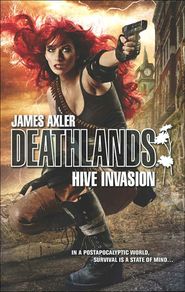По всем вопросам обращайтесь на: info@litportal.ru
(©) 2003-2024.
✖
Warlord Of The Pit
Автор
Год написания книги
2019
Настройки чтения
Размер шрифта
Высота строк
Поля
He laughed shortly at his own joke although no else did.
“Follow me.” Clarise led the men farther down the passageway between the wooden crates. It was extremely dark in the narrow aisle, almost pitch-black.
Far too late, Kane sensed the rush of bodies. He tried to acquire a target for his Bren Ten, but a hard foot whipped out of the gloom and slammed into the pit of his stomach, just above his groin. The air exploded from his lungs, and he folded in the direction of the sickening pain. He staggered, trying to force himself erect, only to feel his shoulders gripped by hands that should have belonged to a great ape.
Kane shook himself violently to break free of the agonizing grasp. In the murk, he heard Grant’s voice blurt a curse, then Clarise shouting in French. A series of smacking, thudding impacts filled the damp, the sound of savage struggle at close quarters.
A man cried out in pain and a white shaft of gunfire blazed in the darkness. A body fell heavily almost at Kane’s feet. His assailant shifted his grip from his upper arms to a bear hug, catching him up in a crushing embrace, pinning his arms against his sides. He thought he heard a rib break, but then realized it was the sound of a bladed weapon chopping into a wooden crate.
Sagging forward, Kane shifted his center of gravity into a dead, unresisting mass. His attacker loosened his grip ever so slightly, trying to pull him upright. Planting his feet firmly on the ground, Kane kicked himself backward, smashing the rear of his skull into the nose and mouth of the man standing behind him. He stumbled backward and crashed into a crate. Kane broke free and turned, gasping for air. He glimpsed a shadowy shape rushing toward him, arms outspread, and he squeezed off two shots. He heard a ghastly gurgle and a heavy body toppled nearly at his feet.
Kane leaned against a crate, breathing hard, heart trip-hammering. He heard Grant’s voice, “Kane! Where the hell are you?”
He coughed and replied, “Here. Where the hell are you?”
“Getting the hell out of here. Follow my voice.”
Kane did so, tripping over two bodies before he found his companions clustered at the far end of the aisle formed by the shipping crates. They emerged at the edge of the jungle. The green wall of foliage looked thick enough to be nearly impenetrable, but Clarise found a small path. Everyone fell into step behind her, walking single file. Kane’s mind toyed with images of poisonous snakes coiled to strike, of scorpions clinging to low-hanging branches and worse forms of wildlife. He knew from prior experience that all jungles held nasty surprises.
Clarise led the way with quick confidence despite the dark. The wind died down to no more than an intermittent breeze. The rain ebbed to a drizzle, then only a spritzing. Lightning still arced across the sky, but the heart of the storm was a couple of miles away. Humidity rose, and streamers of mist curled up from the ground. The world was a primeval, menacing green with night-blooming epiphytes and flowering creepers stretching down from the branches overhead.
They roused a family of langurs, monkeys with white eye rings. There was a brief, outraged chittering as they jumped in great arcs between the trees. No one spoke as they marched. There was the constant pelt and drip of water from the canopy of leaves above them. Kane kept checking his bare arms for the giant gray leeches that dropped from the branches and attached themselves to the flesh.
In the darkness, the danger of straying off the path, and becoming lost was a greater hazard than leeches. Even in daylight, enveloped within the suffocating heat and humidity and thick foliage it would have been difficult to find the trail.
Then the overgrowth opened up in a small clearing. In the center rose a mat hut built on rickety, leaning stilts. The tips of the thatched roof dripped incessantly with rainwater.
The people quickly climbed up a bamboo ladder into the interior of the hut. The reed walls exuded a cloying, pungent aroma, and the floor was damp. Neither Kane nor Grant relaxed, keeping their weapons close to hand. Mersano produced a candle from a small box and lit the wick with a wooden match.
In the flickering, yellow illumination, everyone stared at the outlanders with a mixture of bemusement and distrust, but no one spoke. Irritably, Kane asked, “Is anybody going to tell us what’s going on here?”
Clarise’s shoulders lifted in a shrug beneath her rain cape. “Pandakar is a pirate stronghold and has been for the last one hundred years. It’s a family business.”
“Not surprising,” Grant said. “Piracy flourished in this part of the world up until the late twentieth century.”
“The extent of it is becoming a little too broad,” Kane stated. “Trade lanes and shipping routes are closing down. According to our intel, Captain Saragayn’s fleet looted 300 ships last year.”
“More like 310,” Clarise replied. “He tried to expand onto land, setting up an empire along the China coast. He seized territory and villages, but the armies of several warlords united and drove him out.”
“Saragayn suffered major losses,” Mersano interposed smoothly. “He’s weak in terms of manpower and matériel. We thought this would be the optimum time to overthrow him.”
“Apparently you miscalculated,” Kane pointed out dryly.
“Not as much as you might think,” Clarise countered. “We drew most of his forces away from his treasure ship. We’ve got our own people on the inside.”
“Like you?” Grant inquired. He looked toward Mersano. “And you’re one of his rivals?”
An enigmatic smile touched his lips. “You might say that. I’m his son, back from exile. Most of the captain’s inner circle is made up of his bastard spawn who have their own designs on the old man’s fortune.”
Kane gusted out a sigh. “This is starting to sound complicated.”
Clarise chuckled. “We did say it was a family business.”
“I have my own small fleet,” Mersano continued proudly. “My theater of operations is the Sulu Sea. Occasionally we raid along the south China coast, but I prefer the merchant junks. I also run military supplies—guns, food and medicine—to some of the warlords setting up in shop in Indochina. I have my own connections, so I don’t need Saragayn.”
“Then why are you staging this attack?” Grant challenged.
“Saragayn is considered a devil incarnate, even here where life is not held even to the value of a cigar,” Clarise said grimly.
“My father is still ambitious,” Mersano went on, “but his ambitions exist now for their own sake. Wealth is only a means to an end with him. He’ll never be satisfied. And now he’s negotiating with outsiders who’ve promised him support if he stages a new assault on China.”
“These outsiders you mentioned…do they happen to travel under the name of the Millennial Consortium?” Kane intoned quietly.
Clarise’s eyes narrowed, her full lips creasing in a frown. “They do. Is it because of them you are here? To prevent that alliance?”
Kane dug into a pants pocket and produced a small button made of base metal. He flipped it toward Clarise, who snatched it out of the air. Holding it close to the flame of the candle, she examined the image inscribed upon it: the stylized representation of a standing, featureless man holding a cornucopia—a horn of plenty—in his left hand and a sword in his right, both crossed over his chest.
“Have you seen anyone wearing that button?” Kane asked.
Clarise nodded. Tossing aside her rain cloak, she turned out the lapel of her shirt and displayed an identical disk. “This should give you an idea of how deep the infiltration has become. Even Saragayn’s top officers are required to wear those buttons.”
“Who is the consortium emissary?” Grant asked.
“He goes by the name of Mr. Book. Obviously an alias.”
“Obviously,” Grant agreed. “Is he here now?”
The woman shook her head. “I don’t know. Perhaps he got wind of the insurrection and fled, with the idea of returning and cutting a deal with the winner.”
Kane smiled without humor. “Yeah, that’s the consortium’s strategy, all right.”
“I placed my men all along the waterfront,” Mersano said. “Even aboard the Juabal Hadiah. Scores of them are masquerading as laborers, fishermen, deckhands. We thought when the time came, we would strike all at once and seize power quickly.”
“We were betrayed,” Clarise said softly, bleakly.
“That’s all very interesting,” Grant stated, “but at this point all we care about is recovering our friend and getting out of here.”
“Captain Saragayn won’t let Baptiste go now,” Clarise replied.
Kane’s jaw muscles tightened into knots. “Why not?”
“For one thing,” Mersano said, “he might suspect she had something to do with the insurrection.”
“Or,” Grant interjected, “if she was spotted by the consortium agent and recognized, she could have been ratted out.”
“Or,” Clarise said, “there could be a simpler explanation—Saragayn wants her for himself. But whatever the reason, if you want Baptiste back, your only option is to ally yourselves with us. I’m sure you’ve heard the old bromide about the enemy of my enemy is my friend.”
“Yeah, we have.” Kane blew out a disgusted breath. “Too many damn times.”











